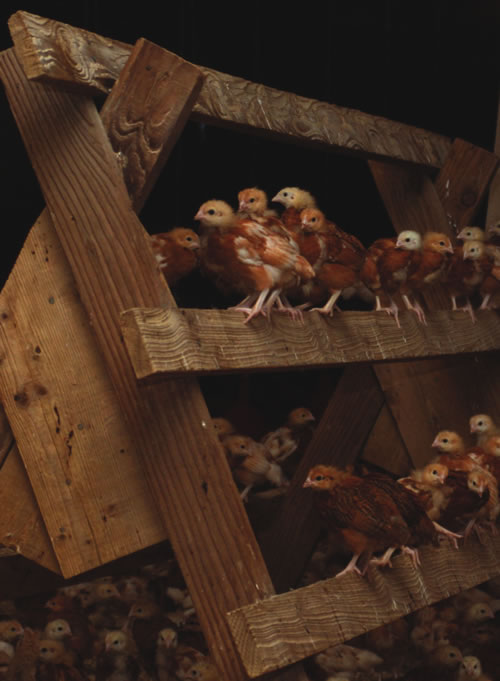
The impending ban on conventional laying cages could well put extra pressure on pullet rearers and impact on the availability of pullets for free range producers.
That is the view of Steve Carlyle of Country Fresh Pullets – one of the United Kingdom’s largest independent pullet rearing companies. Country Fresh Pullets rears more than six million point of lay pullets each year, but Steve says that supplies of pullets are likely to become very tight and he says producers should plan well ahead to ensure their needs can be met by rearers.
"Producers need fully to understand that the process of producing pullets is a six month process in itself. I think producers should be looking 18 months ahead and booking their pullets to secure space. If producers know they want the pullets and they know when they want them and they are happy with the rearer they have previously chosen, why not book them? A pricing structure can be agreed that would be fair to all parties. If people think that by booking late they might get a better deal they might come unstuck completely," said Steve, who said that the introduction of the ban on conventional cages across the EU was likely to concentrate demand for the pullet rearing sector
As we reported last month, the UK Government has now indicated how it intends to introduce the EU ban on conventional cages. Its decision means that any producer who wishes to complete a full 13 month laying cycle will be unable to house a flock in a conventional cage system after December 2010. The EU ban takes effect on January 1 2012, and egg industry representatives had hoped that any laying flocks in place by that date would be allowed to complete their cycle. Those hopes appear to have been dashed by Jim Fitzpatrick, Minister for Food, Farming and Environment, who has written to the British Egg Industry Council to say that all laying hens will have to be out of conventional cages by January 1 2012.
Steve Carlyle says the decision has implications for the pullet rearing sector and supplies of pullets could be stretched as cage producers adjust requirements to maximise the use of their conventional cages.

"To get a full normal laying cycle, producers will have to decide whether they want to house birds in December 2010. It is normally a fairly good egg market up to Christmas and I can’t see a lot of producers wanting to take birds out and re-house during the December ’goldrush’ for want of a better word," he said. "They will therefore have to decide, then, whether they want to put pullets in in January 2011 or in October or November 2010."
He said rearers would have to be speaking to customers to find out what their intentions were when the conventional cage ban came into force. They would need to know whether they would be investing in enriched cages, whether they would be switching to free range or whether they would be going out of egg production completely.
"If they are going into enriched cages we will continue to rear in cages for that market, if they are going into free range we need to reduce the cage rearing base and increase the litter rearing base and if they are going out we need to look at matching supply and demand to a reduced market. These are big decisions for rearers," he said. "Whereas most rearers have their rearing space spread out throughout the year, there might be a time when we need to meet an increased demand in October or November 2010 or January 2011 to satisfy commercial pressures.
"We need to be looking at this as soon as possible. Rearing farms work on a 20 or 22 week cycle, so we haven’t got much time to adjust to meet this change in the normal programming of laying birds."
He said he expected that demand for free range would continue to increase – more so as a result of the ban on conventional cages - and he said that more rearing space would be needed to provide free range producers with pullets. "We will definitely need more litter rearing facilities and we may well need more litter rearing multi-tier facilities so we can supply multi-tier free range producers. That’s a considerable investment in the rearing sector," said Steve, who said rearers would need to see the possibility of a making a return on that investment if they were to go ahead.
"The rearing sector has had poor returns historically. We are trying to encourage rearers to put systems in to meet free range requirements. We need to be encouraging people into rearing and to make the investment. That needs to be backed up by a return for the rearers," said Steve, who also pointed out that chick prices had recently increased.
Steve said that at Country Fresh Pullets cage accounted for some 45 per cent of current rearing space. That was unlikely to continue as a result of the conventional cage ban. Cage units would be converted to litter rearing units and new litter rearing facilities would be needed to meet the demand of the growing free range market.
"We are currently converting some of our cage laying sites into rearing farms; taking cages out and making litter rearing facilities for the free range sector. That is helping us find more litter space to meet the new litter demand and the decrease in cages." He said the company had about 600,000 birds in laying cages. Two sites were being converted to litter rearing; the others would be reviewed by January 1 2012.
The company is continuing to invest in pullet rearing, although Steve says the industry does face a challenge with the approach of the cage ban. "The market is tight at the moment. There is not much availability, and a recent survey by the Pullet Rearers’ Association showed that pullet supplies going forward would be tight."
He said it was more important than ever for producers to speak to their pullet rearers, let them know what their intentions were and put plans in place.
Keep up to date with all the latest free range news by joining the British Free Range Egg Producers Association. Full details at www.theranger.co.uk
